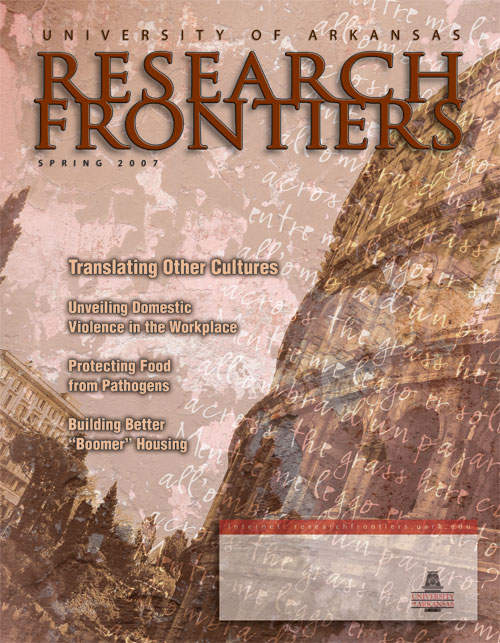FAYETTEVILLE, Ark. — The spring issue of Research Frontiers magazine is now available online, and the Web issue has a few additions for those who wish to get more from their magazine.
The online edition adds to its new look with links to related articles and a place for readers to submit questions to the UA Q&A.
“We are moving forward in our goal to make Research Frontiers online a more dynamic and interactive publication,” said Melissa Lutz Blouin, editor of the publication.
The spring 2006 issue focuses on researchers who work with water, with all four feature stories addressing different aspects of life’s most essential ingredient. In the first story, geosciences, biological sciences, soil sciences and engineering researchers study the relationship between the ground and the water by focusing on aquifers. They work in the Savoy Experimental Watershed, a unique water system that allows researchers to study how water enters the ground, where it goes and how it is processed.
In the second article, law professor Phillip Norvell discusses water rights issues and their implications as water becomes a more valuable and possibly scarce commodity.
Steve Luoni, director of the University of Arkansas Community Design Center, has teamed up with Mark Boyer, a landscape architecture professor, and Marty Matlock, a biological and agricultural engineering professor, to look at creative ways to sculpt streams to mitigate flooding and create urban green spaces for many different uses.
The final story addresses the work of four different engineering professors, each of whom is approaching water quality issues from a different angle. Tom Soerens has created a low-cost water filtration system that is being used by a rural village in Colombia. Indrajeet Chaubey has created the Beaver Lake Watershed Decision Support System, a modeling system that can help predict how changes in land use will affect the water quality in Beaver Lake, which provides drinking water to almost 300,000 people in Northwest Arkansas. Finally, engineers Scott Osborn and Marty Matlock have created a system to saturate water with oxygen, a crucial component of the process for breaking down bacteria in wastewater treatment.
Although the other parts of the magazine don’t focus on water, that doesn’t mean they’re dry. In the UA Q&A, you can find out how coffee is decaffeinated and what, exactly, is game theory. On the facing page, literature professor and Chaucer scholar William Quinn discusses how a work of literature intended for oral performance changes when it is written down.
Speaking of writing things down, In Review features new titles by university professors and the University of Arkansas Press. These include “Identification of Microorganisms by Mass Spectrometry” edited by Charles L. Wilkins and Jackson O. Lay Jr.; “The ADD/ADHD Revolution: Treatments that Work” by LaVonne Kirkpatrick and Rick Kirkpatrick; “Divided Power: The Presidency, Congress and the Formation of American Foreign Policy,” edited by Donald R. Kelley; “Autobiography of Samuel S. Hildebrand: The Renowned Missouri Bushwhacker,” edited by Kirby Ross; “Lee Teng-hui and Taiwan’s Quest for Identity” by Shih-shan Henry Tsai; and “Dying Light and Other Stories” by Donald Hays.
The student research feature showcases the work of Shelly Kaufman, a junior biophysical chemistry major, who has been working in Matt McIntosh’s lab, developing the components of a possible molecule for anti-cancer therapy.
To see Research Frontiers on the Web, please visit: http://researchfrontiers.uark.edu .
Contacts
,
